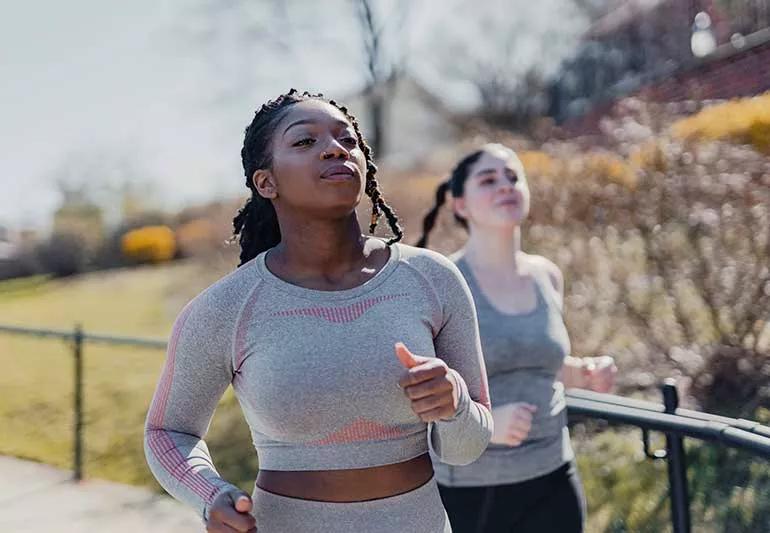Your body’s natural response to starting workouts may include an urge to scratch

Image content: This image is available to view online.
View image online (https://assets.clevelandclinic.org/transform/8e9a6fff-409a-4512-8ca2-363ad3a3e6ae/Runners-Itch-1347107115-770x533-1_jpg)
Two runners outside.
You’re midway through a run when an itchy feeling hits your legs. It’s barely noticeable at first. Then it gets a bit worse … and then a little uncomfortable … and then climbs to PLEASE MAKE IT STOP levels.
Advertisement
Cleveland Clinic is a non-profit academic medical center. Advertising on our site helps support our mission. We do not endorse non-Cleveland Clinic products or services. Policy
Within minutes, scratched-up thighs can replace a runner’s high as you claw at your legs in search of relief.
This sensation is known as runner’s itch — and it’s actually pretty common for beginning runners or those restarting their training after taking time off. So, what causes this temporary misery? Exercise physiologist Katie Lawton, MEd, has your answer.
The name of this condition is a near-perfect match for what it is. Basically, runner’s itch refers to a prickly feeling that develops on your skin during exercise. “It’s exactly what it sounds like,” says Lawton.
The itchiness typically hits your legs or stomach — and it can be intense enough to stop you in your tracks to start scratching.
The good news? The condition isn’t a cause for major concern. Better yet, runner’s itch is temporary and typically subsides soon after the workout. “It’s not something that usually hangs around,” notes Lawton.
It’s also not something guaranteed to hit every new runner or workout warrior.
One last thing, too: This aggravating itchiness doesn’t only pain runners. It can flare up during any cardio activity that elevates your heart rate and gets your blood pumping. (More on that in a moment.)
Itchy skin (and the urge to scratch it) tops the list of symptoms. Your skin also may become:
Advertisement
It’s time to talk about blood flow, the force that flips the itch switch. Here’s how it happens.
As you start running or doing a cardio workout, your heart kicks into a higher gear to deliver blood and oxygen to your muscles. This rush of blood fills the hair-thin blood vessels called capillaries that connect arteries and veins.
As those capillaries expand, they can bump against nearby nerve endings. That stimulation of nerve cells is enough to launch an itchy-itchy feeling.
If you’re new to running or returning to it, that capillary expansion can really set things off.
“It can be part of your body’s vascular response to a change in activity,” explains Lawton. “If you’re going from a more sedentary lifestyle to suddenly running a bunch of miles, there’s a chance you experience runner’s itch.”
There’s also research that suggests your body may release histamine during exercise to fight fatigue, which could also cause blood vessels to expand. (Histamine, of course, is typically used if your body senses a threat from an allergen. Insert your allergic-to-running joke here.)
Let’s look at this in two ways — immediate and long term.
That itchy feeling should stop with your workout as your heart rate slows, blood flow lessens and those expanded capillaries shrink a bit, says Lawton.
If the itchiness lingers, though, try:
If you condition your body to handle that cardio-induced blood flow, you’re less apt to experience runner’s itch. Slowly working your way into a running program may help keep the itching at bay.
“Consider the itching a signal from your body that you may be overdoing it, then adjust accordingly,” suggests Lawton.
And once you establish a running routine, keep with it. Logging consistent miles helps your body become better equipped to handle increased blood flow demands without triggering an itchy response.
In addition, wearing compression socks also can help improve circulation in your legs and minimize potential problems.
An itch while running doesn’t have to be runner’s itch, of course. Trotting for many miles at a time while pouring out sweat brings all sorts of skin complications. “Chafing and irritated skin are very real things for runners,” says Lawton.
So, before you automatically assume you have a case of runner’s itch, consider these four factors, too:
Advertisement
A basic case of runner’s itch typically resolves itself. But if the symptoms continue or worsen over time, it’s worth talking about with a healthcare provider.
And reach out to a doctor if your itchiness is joined by dizziness or breathing issues.
“If the itching or rash doesn’t seem temporary, see someone about it,” states Lawton. “And if you’re noticing symptoms that seem to go beyond runner’s itch, it’s worth going in to get checked.”
Advertisement

Sign up for our Health Essentials emails for expert guidance on nutrition, fitness, sleep, skin care and more.
Learn more about our editorial process.
Advertisement
Your diet in the weeks, days and hours ahead of your race can power you to the finish line
Using precautions like bandages and lubricants can help you run away from this uncomfortable condition
Reducing your pace allows you to log more miles and train your body for the stress of running
Running doesn’t cause knee arthritis, but you can take steps to minimize cartilage damage
Months of preparation go into readying your body to run 26.2 miles
A few precautions can keep your toenails from turning black and falling off
What you should know before hitting a race before the big Thanksgiving meal
As a training tool, ditching your shoes could help you build better running form to avoid injury
Although it could be used as a moisturizer, this new trend is not recommended
Communicating clear limits helps protect your time, energy and emotional well-being
High cholesterol can be genetic, but testing and treatment can lower your heart disease risk